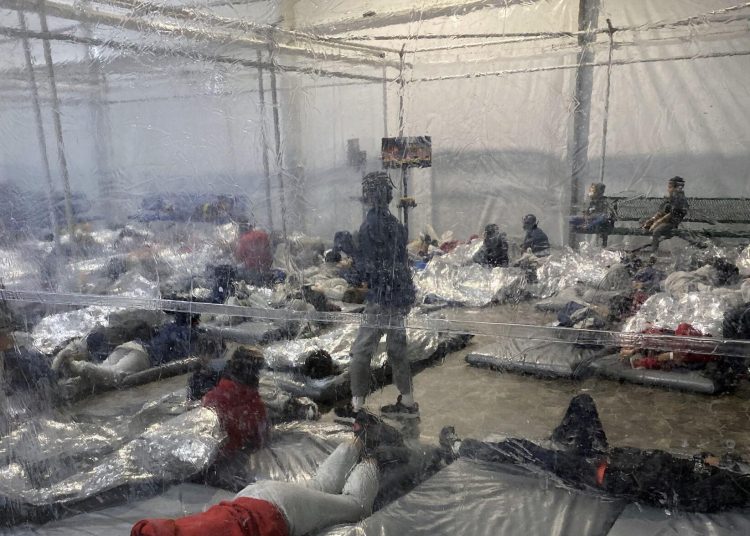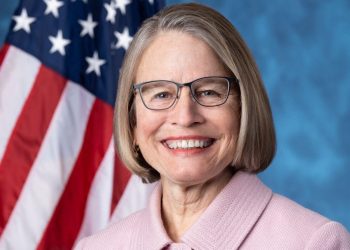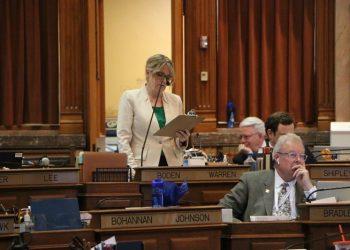(The Center Square) – After announcing Iowa would not honor a request by President Joe Biden to host unaccompanied minor immigrants in the state, Gov. Kim Reynolds has received support from legislators and some within the law enforcement community.
Reynolds said in an interview on the “Need to Know with Jeff Angelo” show on WHO Radio on April 8 that Iowa has declined to accommodate a federal request of the state to accept some of the nearly 19,000 unaccompanied children who had traveled alone across the U.S.-Mexico border.
“We will not do that,” Reynolds said during the interview with Angelo. “We do not have the facilities. We are not set up to do that. This is not our problem; this is the president’s problem. He’s the one who opened the borders. He needs to be responsible for this and he needs to stop it. So, at this point, no.”
Ten Iowa sheriffs signed a letter dated April 7 urging Biden “to reverse course and help us protect our communities by securing the southern border.”
Customs and Border Protection has projected that more than 1 million unaccompanied minors will illegally enter the U.S. this year. Texas Gov. Greg Abbott wrote a letter April 9 to Vice President Kamala Harris demanding that the Biden Administration close a federally run facility in San Antonio that has held unaccompanied migrant minors, citing allegations of sexual assault, bullying, understaffing and disregard for COVID-19 protocols at the facility.
Senator Jake Chapman, R-Adel, president of the Iowa Senate, told The Center Square in a texted statement April 12 that he stands by Reynolds’ decision.
“Iowa does not have the structural support, nor do we have the facilities necessary to house unaccompanied minors in a responsible manner,” Chapman said. “The reality is that the President is responsible for this tragic and foreseeable crisis at the border. This incredibly sad situation for migrant children must be addressed by the administration who encouraged the migration, and who halted the construction of the wall on his first day of office.”
Reynolds also said Iowa is struggling to place “Iowa children” who need foster homes.
“We have already seen an uptick of drugs and human trafficking and fentanyl [coming across these borders] that is coming through this country and our state and this only just expedites that,” Reynolds said. “It’s unconscionable what we’re seeing and the cost and the dollars that they’re putting into supporting illegal immigrants and to taking care of these children.”
Iowa Department of Human Services Director Kelly Garcia notified the federal Administration for Children and Families on March 31 that Iowa “is not in a position to take unaccompanied minors at this time” due to limited resources and “administrative concerns,” following recommendations from the department’s team, the department’s Chief of Strategic Communications Matt Highland told The Center Square in an emailed statement April 12.
Darlene Taylor, a program specialist of the U.S. Department of Health and Human Services Administration for Children and Families Region 7 (IA, KS, MO and NE), had asked the region’s states regarding existing state-licensed residential and home-based child care beds available and the days needed to make them available, according to an email thread Highland sent The Center Square.
Highland said the department has an estimated 195 “available and staffed beds,” which may not be “appropriate placements for small children.”
“Currently group care providers now serve kids and teenagers with more severe behavioral health challenges, trauma and sexualized behavior,” Highland said. “Placing unaccompanied minors in this environment is not appropriate. Mixing young, non-English speaking kids with this population raises serious safety concerns.”
He said that placing the unaccompanied minors would also require additional supports such as medical and behavioral care, schooling, clothing, ensuring safety and bilingual staff. He added that the department has been working to reduce caseloads for social workers. Accommodating the request would add to their caseload and give them “the additional challenge of finding forever homes” for the migrant children.
“We have an obligation to take care of our children first and absent the resources or a clear and comprehensive plan for federal support, we were unable to accommodate the request,” Highland added. “We acknowledge this is an incredibly saddening and difficult situation.”
















